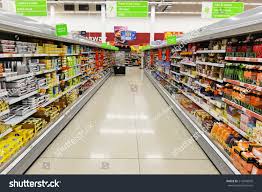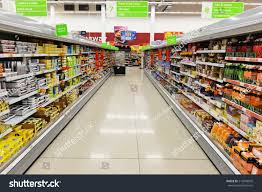
In the last few week, high end retail chains like Tesco and Sainsbury's, appear to have made most of the high rates of inflation in Britain – which is at an all time high in the last four-year period. All of the four big UK retailing companies reported the strongest growth rates in the last few weeks, a be it that all of them also have lost ground to the discounters in the most recent quarter.
According to a Kantar Worldpanel forecast issued on Tuesday, the weekend – specifically Friday and Saturday before Christmas day, would see t he UK shoppers filling up their purchase trollies with goods worth over £1.5 billion which would itself be a record for the period.
The Kantar study also reported that buoyed by a 3.6 per cent rise in the like-for-like grocery inflation rate – which is the highest level reached since 2013, there has been a marked increase of 3.1 per cent year-on-year in the growth in the sales of British supermarket in the past 12 weeks.
While Tesco managed to record an increase of revenue growth of 2.5 per cent in that period, it also lost out about 0.1 per cent of its market share – touching 28.2 per cent, when recording numbers among the four largest retail operators in the country.
There was also a 0.2 per cent dip in the market share of Sainsbury’s in the same period as its share dropped from 16.5 per cent to 16.3 per cent, but the retailer also saw an increase in its revenue growth rate by 2.0 per cent.
There was also a fall in market share for Asda which touched 15 per cent even though the company reported a rise in sale of 1.2 per cent in the period. On the other hand, Morrisons’ market share was down by 2.0 per cent to touch 10.6 per cent while its revenues grew by 1.4 per cent.
The fastest growing retailer was the discount retailer Aldi with a reported market share of 15.1 per cent while the fellow German rivals Lidl reported a market share of 14.5 per cent.
In the 12 weeks under consideration, Ocado managed to retain its market share of 1.3 per cent driven by a robust 5.2 per cent growth in revenues.
The only major retailer to report a fall in sale growth was Co-op with a drop of 1.5 per cent in the study period and the retailer also saw a drop in its market share from 6.3 per cent to 6.90 per cent.
“Despite higher prices the British public is well into the swing of festive shopping," said Fraser McKevitt, head of retail and consumer insight at Kantar Worldpanel.
McKevitt noted that the high rate of revenue growth was due to the fact that the shoppers had chosen to purchase more expensive festive products even though the over all volume of sale had also grown. A noteworthy growth was reported in the alcohol segment which reported volume growth of almost £172 million year-on-year.
"Gin, whisky and sparkling wine all saw significant growth: up by 26%, 10% and 7% respectively as shoppers pushed the boat out. Still small but growing rapidly, non-alcoholic beer is the new kid on the block this Christmas – growing sales by 27% during the past 12 weeks, the report said.
(Source:www.digitallook.com)
According to a Kantar Worldpanel forecast issued on Tuesday, the weekend – specifically Friday and Saturday before Christmas day, would see t he UK shoppers filling up their purchase trollies with goods worth over £1.5 billion which would itself be a record for the period.
The Kantar study also reported that buoyed by a 3.6 per cent rise in the like-for-like grocery inflation rate – which is the highest level reached since 2013, there has been a marked increase of 3.1 per cent year-on-year in the growth in the sales of British supermarket in the past 12 weeks.
While Tesco managed to record an increase of revenue growth of 2.5 per cent in that period, it also lost out about 0.1 per cent of its market share – touching 28.2 per cent, when recording numbers among the four largest retail operators in the country.
There was also a 0.2 per cent dip in the market share of Sainsbury’s in the same period as its share dropped from 16.5 per cent to 16.3 per cent, but the retailer also saw an increase in its revenue growth rate by 2.0 per cent.
There was also a fall in market share for Asda which touched 15 per cent even though the company reported a rise in sale of 1.2 per cent in the period. On the other hand, Morrisons’ market share was down by 2.0 per cent to touch 10.6 per cent while its revenues grew by 1.4 per cent.
The fastest growing retailer was the discount retailer Aldi with a reported market share of 15.1 per cent while the fellow German rivals Lidl reported a market share of 14.5 per cent.
In the 12 weeks under consideration, Ocado managed to retain its market share of 1.3 per cent driven by a robust 5.2 per cent growth in revenues.
The only major retailer to report a fall in sale growth was Co-op with a drop of 1.5 per cent in the study period and the retailer also saw a drop in its market share from 6.3 per cent to 6.90 per cent.
“Despite higher prices the British public is well into the swing of festive shopping," said Fraser McKevitt, head of retail and consumer insight at Kantar Worldpanel.
McKevitt noted that the high rate of revenue growth was due to the fact that the shoppers had chosen to purchase more expensive festive products even though the over all volume of sale had also grown. A noteworthy growth was reported in the alcohol segment which reported volume growth of almost £172 million year-on-year.
"Gin, whisky and sparkling wine all saw significant growth: up by 26%, 10% and 7% respectively as shoppers pushed the boat out. Still small but growing rapidly, non-alcoholic beer is the new kid on the block this Christmas – growing sales by 27% during the past 12 weeks, the report said.
(Source:www.digitallook.com)





